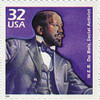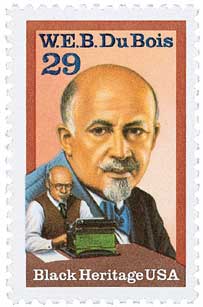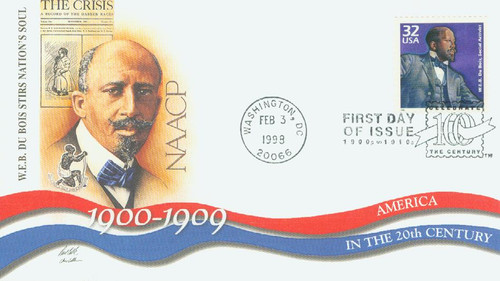
# 3182l - 1998 32c Celebrate the Century - 1900s: W.E.B. DuBois
1998 32¢ W.E.B. Du Bois, Social Activist
Celebrate the Century – 1900s
City: Washington, DC
Quantity: 12,533,333
Printed By: Ashton-Potter (USA) Ltd
Printing Method: Lithographed
Perforations: 11 ½
Color: Multicolored
Birth Of W.E.B. Du Bois
Du Bois attended an integrated school where his teachers recognized his talents and encouraged his ambitions. This positive environment led Du Bois on a path to use his knowledge to empower African Americans.
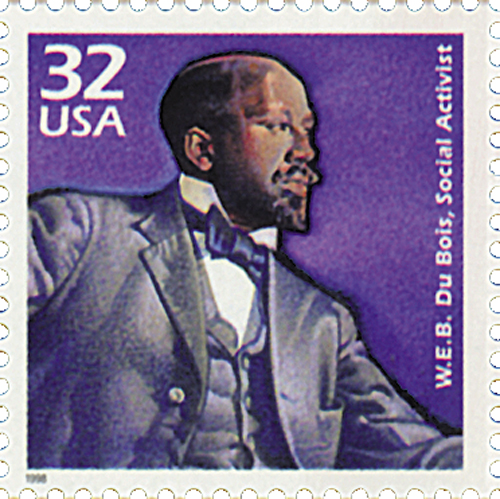
Donations from his neighbors allowed Du Bois to attend Fisk University in Nashville, Tennessee. It was during his time in the South that Du Bois first experienced intense racism and bigotry. After graduating, Du Bois went on to attend Harvard, where he earned a second bachelor’s degree in 1890.
Du Bois traveled to Berlin in 1892 thanks to a fellowship from the John F. Slater Fund for the Education of Freedmen. This experience allowed him to travel Europe and become acquainted with leading social scientists. Du Bois returned to America and finished his graduate studies, becoming the first African American to get a Ph.D. from Harvard in 1895.
After graduating, Du Bois spent two years teaching at Wilberforce University in Ohio. From there he took a research job at the University of Pennsylvania. This led Du Bois to study Philadelphia’s African American neighborhoods, resulting in the first case study of an African American community in the U.S. As a result of the study, Du Bois was convinced that racial integration was the key to equality.
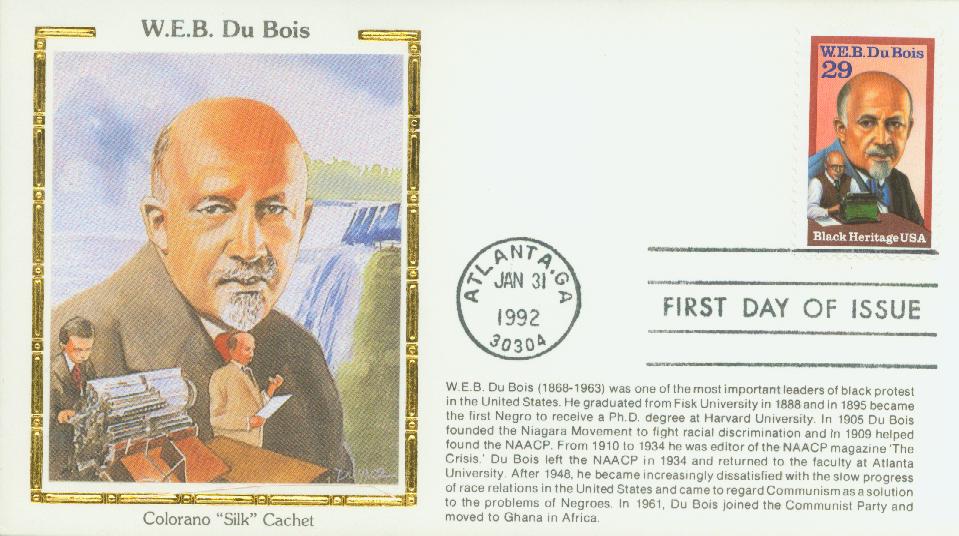
Du Bois left Pennsylvania in 1897 to serve as a professor of history and economics at Atlanta University. During this time he produced a number of high-profile papers and hosted annual conferences. Three years later, he attended the First Pan-African Conference. While there he penned the “Address to the Nations of the World,” which called for nations to fight racism, encourage self-government in Africa and the West Indies, and demand African American rights. The conference adopted his letter and then sent it to every nation that should be affected by it.

After that conference, Du Bois emerged as one of the leading spokesmen for African American rights, along with Booker T. Washington. However, Du Bois opposed Washington’s Atlanta Compromise, which encouraged African Americans to accept discrimination and segregation in return for a basic education and limited economic opportunities.
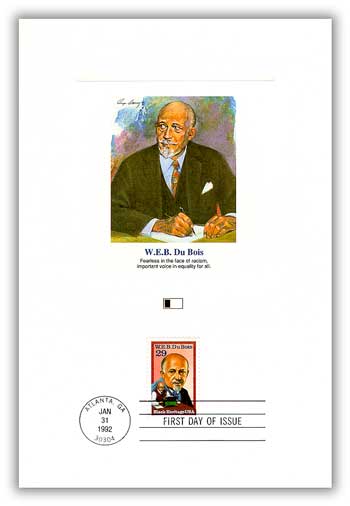
Du Bois wrote throughout most of his adult life. Some works, such as The Souls of Black Folk, were aimed at shining a light on the genius of African Americans. He produced editorials on current events and scholarly work, including a biography of John Brown.
In 1905, Du Bois and other civil rights activists met near Niagara Falls to discuss their opposition of the Atlanta Compromise. They composed a declaration of principles and formed the Niagara Movement the following year. They wanted to publish their beliefs, but most African American media supported Washington. So Du Bois bought a printing press and created Moon Illustrated Weekly.
In 1909 and 1910, Du Bois attended the first meetings of what became the National Association for the Advancement of Colored People (NAACP). He then served as Director of Publicity and Research, with his main job being to edit their month magazine, The Crisis. In the coming years, Du Bois launched a campaign against lynching, encouraged the Great Migration (of African Americans out of the South), supported an African American military training camp for World War I, and created a children’s magazine.
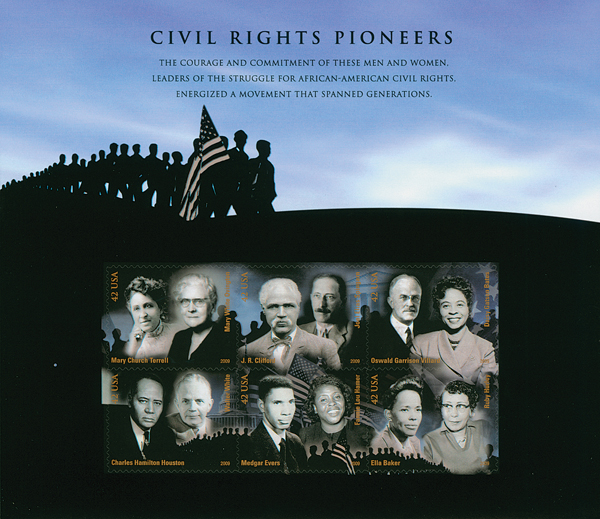
Du Bois eventually left The Crisis due to clashes with the NAACP president and returned to teaching at Atlanta University. He later returned to the NAACP and attended the 1945 United Nations conference. In 1960 Du Bois traveled to Ghana for the “Year of Africa.” While there he began work on the Encyclopedia Africana and became a Ghana citizen before his death on August 27, 1963.
1998 32¢ W.E.B. Du Bois, Social Activist
Celebrate the Century – 1900s
City: Washington, DC
Quantity: 12,533,333
Printed By: Ashton-Potter (USA) Ltd
Printing Method: Lithographed
Perforations: 11 ½
Color: Multicolored
Birth Of W.E.B. Du Bois
Du Bois attended an integrated school where his teachers recognized his talents and encouraged his ambitions. This positive environment led Du Bois on a path to use his knowledge to empower African Americans.

Donations from his neighbors allowed Du Bois to attend Fisk University in Nashville, Tennessee. It was during his time in the South that Du Bois first experienced intense racism and bigotry. After graduating, Du Bois went on to attend Harvard, where he earned a second bachelor’s degree in 1890.
Du Bois traveled to Berlin in 1892 thanks to a fellowship from the John F. Slater Fund for the Education of Freedmen. This experience allowed him to travel Europe and become acquainted with leading social scientists. Du Bois returned to America and finished his graduate studies, becoming the first African American to get a Ph.D. from Harvard in 1895.
After graduating, Du Bois spent two years teaching at Wilberforce University in Ohio. From there he took a research job at the University of Pennsylvania. This led Du Bois to study Philadelphia’s African American neighborhoods, resulting in the first case study of an African American community in the U.S. As a result of the study, Du Bois was convinced that racial integration was the key to equality.

Du Bois left Pennsylvania in 1897 to serve as a professor of history and economics at Atlanta University. During this time he produced a number of high-profile papers and hosted annual conferences. Three years later, he attended the First Pan-African Conference. While there he penned the “Address to the Nations of the World,” which called for nations to fight racism, encourage self-government in Africa and the West Indies, and demand African American rights. The conference adopted his letter and then sent it to every nation that should be affected by it.

After that conference, Du Bois emerged as one of the leading spokesmen for African American rights, along with Booker T. Washington. However, Du Bois opposed Washington’s Atlanta Compromise, which encouraged African Americans to accept discrimination and segregation in return for a basic education and limited economic opportunities.

Du Bois wrote throughout most of his adult life. Some works, such as The Souls of Black Folk, were aimed at shining a light on the genius of African Americans. He produced editorials on current events and scholarly work, including a biography of John Brown.
In 1905, Du Bois and other civil rights activists met near Niagara Falls to discuss their opposition of the Atlanta Compromise. They composed a declaration of principles and formed the Niagara Movement the following year. They wanted to publish their beliefs, but most African American media supported Washington. So Du Bois bought a printing press and created Moon Illustrated Weekly.
In 1909 and 1910, Du Bois attended the first meetings of what became the National Association for the Advancement of Colored People (NAACP). He then served as Director of Publicity and Research, with his main job being to edit their month magazine, The Crisis. In the coming years, Du Bois launched a campaign against lynching, encouraged the Great Migration (of African Americans out of the South), supported an African American military training camp for World War I, and created a children’s magazine.

Du Bois eventually left The Crisis due to clashes with the NAACP president and returned to teaching at Atlanta University. He later returned to the NAACP and attended the 1945 United Nations conference. In 1960 Du Bois traveled to Ghana for the “Year of Africa.” While there he began work on the Encyclopedia Africana and became a Ghana citizen before his death on August 27, 1963.






